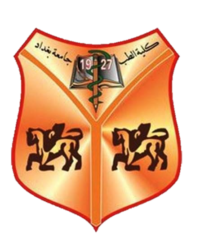Curriculum Description - Forensic Module
This course description provides a necessary summary of the most important characteristics of the course and the expected learning outcomes for the student to achieve evidence of whether they made the most of the available learning opportunities. It must be linked to a description of the program.
General Description
| Category | Details |
|---|---|
| Name of Organization: | Baghdad College of Medicine |
| Department: | Pathology and Forensic Medicine |
| Module Name: | Forensic Medicine FM |
| Course Pattern: | Large group lectures, small group lessons, and forensic center visits |
| Semester and Year: | 4th Year / Semester 1 |
| Total Course Hours: | 15 practical hours + 40 theoretical hours |
Goal of the Course
- Preparing future doctors to write important medical documents such as death certificates and medical reports such as primary forensic medical reports.
- Preparing future doctors to deal appropriately with daily forensic cases in hospitals.
- Focusing on the legal aspect of medical ethics and professional behavior.
Outcome of this Module
A. Cognitive and Theoretical Goals:
- Educating the student about the necessary knowledge needed in forensic medicine after graduation.
- Educating the student about the necessary knowledge needed in forensic medicine branches like toxicology.
- Educating the student about the necessary knowledge needed in the legal aspect of medical ethics and professional behavior.
B. Skills:
- Forensic medical examinations required from hospital doctors.
- Writing primary forensic medical reports and death reports.
Methods of Learning
- Large group lectures.
- Homeworks.
- Self-studies.
- Small teaching groups.
- Practical lessons.
- A visit to the forensic medicine department of the health ministry.
Methods of Assessment
- Written exams.
- Formative assessment.
- Online exams.
- Practical exams.
C. Values and Sentimental Goals:
- Establishing and enforcement of ethical and professional behavior.
Methods of Learning
- Large group lectures, Homeworks, Self-studies, Small teaching groups, Practical lessons, A visit to forensic medicine department of the health ministry.
Methods of Assessment
- Written exams, Formative assessment, Online exams, Practical exams.
D. General and Qualifying Skills (Other Skills Related to Employability and Personal Development):
- Procedures required from doctors like taking swabs from genital areas.
Infrastructure
| Category | Details |
|---|---|
| Course Books Required: | 1. Textbook of Forensic Medicine and Toxicology for Students of Faculties of Medicine and Health Sciences, Second Edition, World Health Organization, Eastern Regional Office (Available online) |
| Main References (Sources): | Simpson's Forensic Medicine, Al-Wajeez in Forensic Medicine |
| Recommended Resources: | 1. The American Journal of Forensic Medicine and Pathology (Critical evaluation of metallization in electrical injuries, December 2017, Volume 38, Issue 4, pp. 333-335)
2. Forensic Science International (The pathology of torture, Available online 18 December 2017) 3. Journal of Medical Ethics (Teaching and assessing medical ethics, Volume 32, Issue 3) 4. Egyptian Journal of Forensic Sciences (An autopsy study of death due to suicidal hanging, Volume 6, Issue 3, September 2016, pp. 248-254) 5. Regional strategy to improve civil status registration systems and statistics Vital (2214-2219), WHO, Eastern Regional Office (The importance of scientific and accurate editing of live birth, birth, and death certificates) |
| Electronic References: | 1. Medical Ethics Book issued by the International Doctors Organization in Geneva (Available online)
2. The World of Forensic Medicine (contains various topics, including self-reading lessons prepared by forensic medicine teachers at the Faculty of Medicine, Baghdad, Professor Dr. Nabil Ghazi Hashim Al-Khateeb) |
Course Development Plan
- Follow up through updated resources and new researches.

